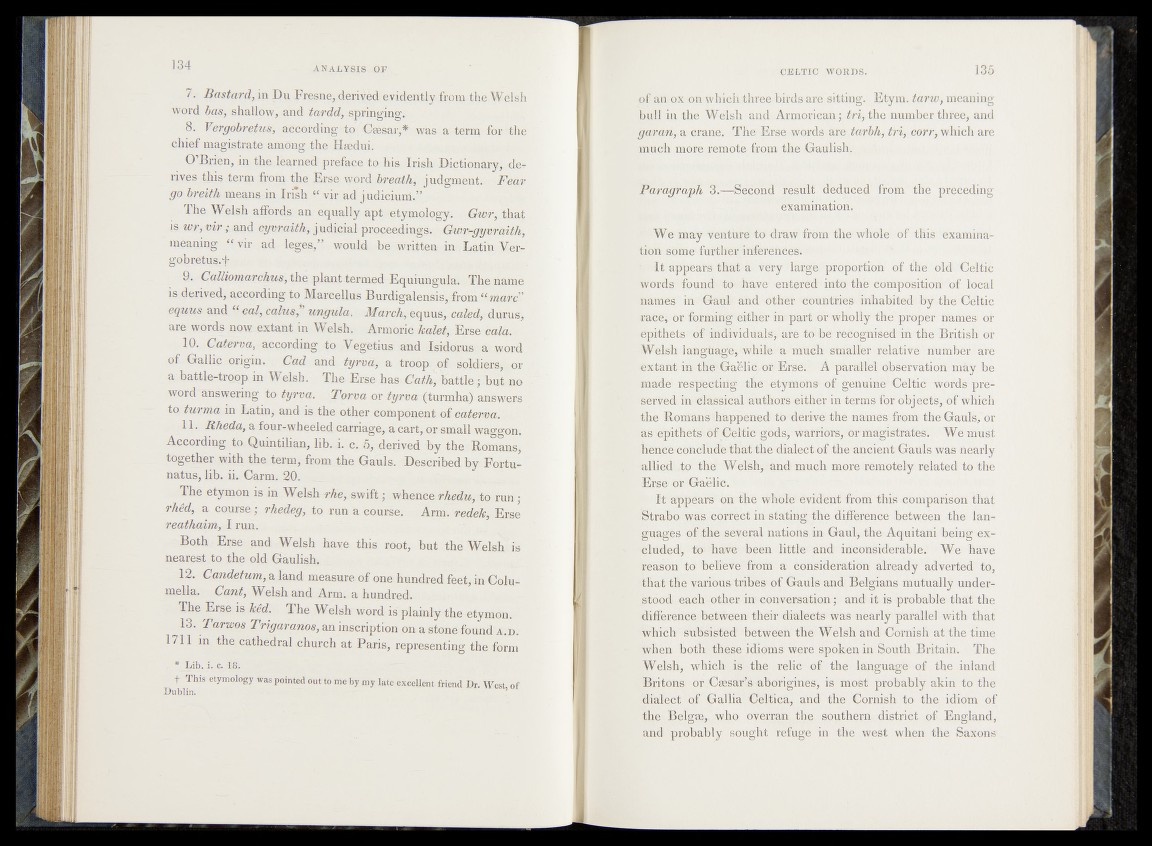
7. Bastardjin Du Fresne, derived evidently from the Welsh
word has, shallow, -and <fa9*dd,. springing.
8. Vergobretus, according to'Gsesar,* was a term for'the
chief magistrate among the Haedui. .
O’Brien, in the learned preface to his Irish Dictionary, derives
this term froiqthe Erse word breath, }udgment, Fear
go breith means in Irish “ vir ad judicium.”
1 he Welsh affords an equally apt -etymolbg-y. Gtort. that
4# -f?f, vir ;rand cyvraith, judicial proceedings Cvtm-gymmth,
Mfleauing ^v ir ad - l ^ i ^ ” would be written in Latin Verr
gobretus-'f .
«1, Calliom<irchu$y the plant termed Equiungula. The name I
is derived, accprdiug to Marcellus Burdigalensis,.from u mar-c”
equus and “ eal, calus* ungula. March, equus, caledf durus,
are; words now~exiant in Welsh, Armoric kalet,. %se eala.
10. Caferva, according to Vegetius and IsidOcus a word
oL Gallic .origin. Cad and tymdy a troop, - o f f o ®
a battle-troop, in Welsh. The Erse has Cath, b a t t l e ^ l p o
word answering to tyrva. Toma or tyroa (turmha) answers
to, turma in Latin, and is the other component oieatema.
1 1 . Rheda, a four-wheeled, carriage, a cart, or-spaM waggon-. I
According to Quintilian, lib. i. c. 5, derived by the Romans,
together with the term, from the Gauls. Described by-Eortu-
natus, lib. ii. Carm. 20.
The etymon is in Welsh vAe, sw ift; whence rhedu, to run \
rhid, a course ,* rhedeg, to run a course. Ang~ redek, Erse
reathmm, I run.
Both Erse and Welsh ha^e this root, but the Welsh is
nearest to the old. Gaulish,
12* Candetum, a land measure of one hundred feet, in Colu-
mella. Cant, Welsh and Arm. a hundred-.
The Erse is Midi The Welsh word is plainly the etymon.
13. Tarwos Trigargnos, an inscription on a stone found
1 7 1 1 in the cathedral^church at Paris, representing the form
- * Lib, i* C.J 18-.
f This etymology was pointed out to me by my late excellent friend Dr. West of
Dublin.
of an, ox on which three birds are sitting. Etym. tarw, meaning
bull in the Welsh and Armorican; tri, the number three, and
garan, a crane. The Erse words are tarbhf tri, corr, which are
much mere remote from the Gaulish.
Paragraph ST—Seedhff jesuli 'deduced' from the preceding
We may venture* to draw from the whole of this examination
Some furthCrli'fHCT4hCeSi4Kr
► It appears that a- very large proportion of the old 'Geltic
iVord's "found to«?haye^f&ntered''into; thb^cu^pbsitron of local
flame's“* in Gaul- £nd other cDUBt^te§>; inhabited by the Celtic
race, or forming either impart or wholly the proper names or
epithets of individual&jfhife to be? rec'oghised'ih the British or
Welsh “white- -a milete' grafelfe? ■■relative number1 are
^extaut-m thd>’G-&£Mfe<# Erse‘s A parallel Observation may be
made respecting me Symons' pf genuine^ Celtic words preserved
in classical authors either in terms for bbjeetSj of which
»the Romans:happeiteekto derive the names from the Gauls, or
ps- e p ith e t b¥ Celti^gM^watriors, -ormagist'ktfes. We must
pbneeceiMude that the dialect of the ancient Gauls was nearly
■al|igf|,to the" Welshy and-much more remotely related to the
Erse or Gaelic.
It appears on the whole evident from thisT Comparison that
'IStrabpAvas' correct in stating the differenCb-nbetween the languages
of the several nations in Gaul, the Aquitani being excluded,
to' have been little and' in’cbffsidterable. We have
Reason to believe'from a' consideration already adverted to,
-tliat the various tribes* of Gauls'and Belgians mutually understood*
each other in conversation; and it is probable that'the
difference bet ween their dialects-was-nearly parallel s with that
which subsisted between the Welsh and* Cornish at the time
when both these idioms were spoken in South Britain. The
Welsh, which is the relic of the language of the inland
Britons o r,Caesar’s aborigines, is most probably akin to the
dialect Qf Gallia Celtica, and the Cornish to the idiom of
the Belgsa,, who. overran the southern district of England,
and probably sought refuge in the west when the Saxons